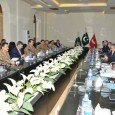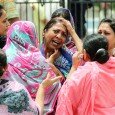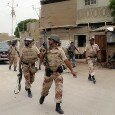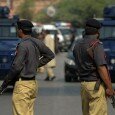By Waqar Gillani –
Can local facilitators, sympathizers and supporters of militant groups be weakened in Pakistan?
Eliminating sleeping cells, local facilitation and sympathy, which is created on different ideological and religious grounds among the locals, is one of the key challenges of Pakistan in its recently unfolded National Action Plan to curb militancy and terrorism.
The militant groups, those have been operating from tribal areas or even across the Afghan border, in various urban units of the country in all provinces, are said to be well connected to the local facilitators. With the help of these local facilitators and sympathizers they get logistical support and hideouts where they come, plan, execute and easily escape from the scenes.
A senior rank official of the Punjab police said that these attacks in urban areas and big cities are always carried through such facilitators which are ideologically like-minded to these militant groups. Sometimes this sympathy is individual and sometimes in a group or organizational. There have been examples in police record where these terrorist outfits and groups also managed to get help from like-minded organizations or their individual members attracting them towards Jihadi ideology.
Dr Omer Kundi, a doctor who graduated from Punjab medical College Faisalabad and was killed in a police encounter in February 2010, is a good example of such facilitators who later joined these groups and executed many serious attacks on security forces and organizations in urban Punjab. Kundi, died at the age of 29, was involved in planning and executing attacks on Inter Services Intelligence (ISI) offices in Punjab, originally was a Jamatud Dawa activist who joined the group in the college after persuaded by the JuD college unit. Initially, he was for Kashmir Jihad but after motivation from certain Taliban linked groups; he converted to Al-Qaeda and joined Tehreek-e-Taliban Pakistan (TTP). Similarly, the attackers of a group of Pakistan Army on Chenab River also belonged to JuD and later joined TTP as individual.
Tariq Pervez, former director general of national Counterterrorism Authority (NACTA), said that this issue is a bog challenge and works on ideological grounds. He says now, though there is amendment in law that security forces can apprehend any such suspect who seems a facilitator or supporter, but an effective strategy is required to deal with this issue.
“There have been 5,000 people included in this list of supporters by security and intelligence agencies in the past few years that are known as facilitators or have individually funded such groups and they are being monitored,” he said.
“Without political will and a counter narrative to challenge this ideological support, the solution is not possible,” he believed. He said the most of these facilitators are from like-minded organizations and many operate individually. These people have been put on fourth schedule too.
Lal Masjid, situated in the heart of Capital of Pakistan, is one bog example of sympathy and possible facilitation, to such militant groups. In a recent video, which has sparked huge protest and resentment among civil society, the mosque and related seminary authorities – Maulana Abdul Aziz and his wife Um-e-Hassaan – issued statements in favour of Taliban and Daesh. Militant groups have sympathizers, facilitators, sleeper agents and activists across the country and even Balochistan is also suffering from same ailments but are different in nature.
Through their local support, these militant groups argue that the Taliban are reacting to the use of force against them by the US and Pakistan, noted political analyst Hasan Askari Rizvi said. The militants recruit the youth from all over the country using the influence of radical madrassas too.
“In order to avoid the threat, which may become potential if looked over, the government will have to act right now. It should take serious action instead of just repeating the rhetoric that it will obliterate all extremists from the face of the earth,” he said. A proper strategy at both federal and provincial level is required to improve the situation to end these support bases in cities and villages, especially, in seminaries.
![]() The writer is a journalist based in Lahore. He tweets @waqargillani
The writer is a journalist based in Lahore. He tweets @waqargillani






























































































